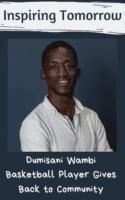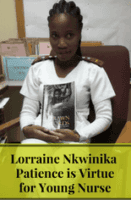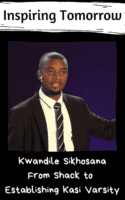It’s not every day that you meet a twenty-eight-year-old who teaches both the intimidating subjects, Mathematical Literacy and Physical Sciences, to all secondary school grades. But Zinhle Dlamini is obviously cut from a superior cloth. Zinhle hails from Johannesburg but moved to Cape Town in 2012 and today she’s a full time teacher at Bergvliet High School. Yet, she herself still sits and ponders how she ended up in teaching.
“If you said I’d be a teacher, then I’d have laughed so hard and told you how crazy you were. The school I went to had limited resources, and I thought having Maths and Sciences meant I can only do a course that is science mainstream. I was quite misinformed, because when I got to university that is when I found out there were many career paths I could have chosen from,” she explains.
Zinhle completed her Bachelor of Sciences (BSc) in Physical Sciences, majoring in Chemistry and Mathematics, at the University of Johannesburg (UJ).
“In my final year in varsity TeachSA came for an exhibition on career day and I went to their desk and enquired about their programmes. They told me they recruit graduates with Maths, Science and English, to go to a township for two years, and they get a chance to give back and make a difference. Furthermore, they’d get teaching training as the journey progressed.” She applied for it and was deployed to Cape Town to do her two years.
Zinhle felt she owed that journey to herself. “Our school didn’t teach at all, because ninety per cent [of the time] we were just chatting with friends, and yet when you get to varsity they expect you know most things. You have to self-teach and work harder than other kids because you have a lot you need to catch up on. This was an opportunity to make a difference and be that teacher I never had at school.” She eventually completed her time with TeachSA at the LEAP Science and Maths School in 2013.
Well, she soon learnt that you can only prepare for the road, but you can’t dictate what will happen.
“While I was working there they gave me a bursary to complete my PGCE (qualification to train graduates who wish to become school teachers) in case I wanted to stay in teaching . At least I would have a qualification to do that. I completed that within the assigned two years and they offered me a permanent position, which was an additional two years from 2014 to 2015.”
After four years with LEAP, Zinhle felt that she had gathered all the necessary experience to take on another challenge.
“The vision didn’t match what I was looking for anymore, so I thought I should look for a more traditional school, with resources, so I could grow as a teacher and get as much exposure as possible, and I started at Bergvliet at the beginning of 2016.” (Bergvliet is a fairly affluent neighbourhood of Cape Town.) “I teach Mathematical Literacy to only grade 11 and then Science from grade 8 to 12,” she adds.
If there’s one thing that teaching has taught her then it’s that age is everything except just a number!
“The [small] age gap makes it difficult for me to teach teenagers because they think I’m just a friend. From the word go you’ve got to set your boundaries, but they will still push you. Some days you even ask why you are doing this; it’s like some kids make it their daily mission to just make it harder for you.”
However, she’s not the type that dwells on the negative too much. “Some days you see a child who’s been struggling to pass a test, and they come to you and express their gratitude for helping them. You see all that delight and confidence, and just get fulfilled. It’s more than just teaching the subject. You are actually teaching the child to believe in themselves, and that’s what keeps me going.”
Not all of them will get to learn how to ‘solve X’ but Zinhle feels that if she can help them solve some life challenges, then she’s served her role.
“I’m teaching hard subjects because kids come to class already intimidated by Maths and Physics, so you teach them to try, because there are hardships in life. The hard work and resilience they put in, in class, carries over to life and varsity. Some of them might not get to learn the science you are teaching them, but they might learn good manners. It’s a case of taking what you can get.” She adds that teaching amounts to lending a shoulder to cry on, for her.
Sometimes you never know how hard shoes pinch until you’ve walked in them, and Zinhle knows just that pain.
“My dad passed away while my mom was still pregnant with me [and] I lost mom in 2005. Culture was then enforced on me because I was told that I shouldn’t cry for mom, as she was a twin; that if I cried for her then her twin brother would pass on as well. From matric [in 2006] I was walking around with all that grief and I was always angry. I was carrying around a lot of pain.”
In varsity she met a friend who then introduced her to a psychologist, and that’s how she overcame her grief.
Zinhle felt she never fully understood the meaning of life until she brought meaning to life. “I have a two-and-a-half-year-old son. Having a child gives you a different perspective in life because it’s no longer about you. Now you have to work two times harder because your child has to attend good schools and varsity. You don’t want to die and leave your kid to be a burden to other people. Having children actually shows how loving one can be.”
Speaking of love, Zinhle says it is her mother’s love that moulded her into what she is. “My mom expected nothing but the best from me. She would not sign a test with a fail on it, and that only meant I’d go back to school and get a beating for not having a signature. Her expectations of me created that drive, so that I ended up expecting myself to do well, even when she had passed on. My family stood by me. It was tough after she passed on but my aunt filled that void. I never felt that I didn’t have parents, because she gave me the exact life they’d have loved for me.”
Zinhle wraps up by sharing the success-recipe that she inherited from her mother:
“A lot of people don’t know what it is that they want to do and it’s OK to allow yourself to be in the process of finding out. You need to do the best in whatever field you find yourself in, and that’s when you see other avenues open up. If you just sit around and wait for things to unfold themselves, then you are setting yourself up for failure. Don’t just sit still and watch DSTV . If things go bad, there’s a lesson. There’s always a room for growth and you must be teachable. Never think you’ve arrived!” she concludes.







